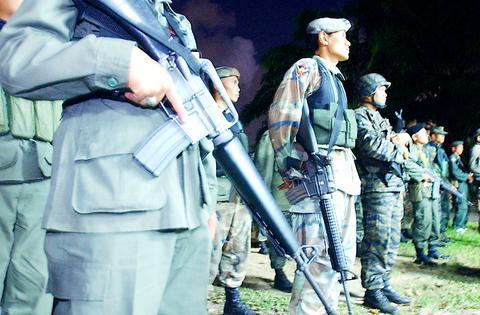After years of claiming that simmering violence in its Muslim south was simple banditry, Thailand is now coming to grips with a scourge that has long plagued other parts of Southeast Asia: terrorism.
A frighteningly coordinated guerrilla assault on an army camp that left four soldiers dead has shaken this mainly Buddhist country.

PHOTO: AP
Thailand's new security adviser General Kitti Rattanachaya yesterday blamed Sunday's attack on the local separatist group, Mujahideen Pattani, with help from outsiders, possibly the Kampulan Mujahideen Malaysia.
Analysts say that militant organization is tied to the regional terror network Jemaah Islamiyah, that is in turn linked to al-Qaeda.
"I believe these groups are certainly linked. They might give moral, ideological or tactical support to each other. These groups know each other well; they were comrades-in-arms in Afghanistan,'' he said.
Sunday night's mayhem started with a ring of fire when 21 schools in a 10km radius around an army camp were set ablaze simultaneously.
Using the arson as a diversion, a gang drove brazenly into the unprepared army camp and pinned down baffled, sleepy troops with automatic weapons fire.
"It was just like in the movies," said Pornpich Phuntamdet Patanakullert, a local legislator.
Roads leading to the camp were blocked by felled trees, tires and nails to slow down reinforcements. The shooting stopped 20 minutes later when the attackers vanished into the night with more than 100 guns stolen from the armory.
Sunday's attack represents the biggest internal security challenge for Prime Minister Thaksin Shinawatra -- a valued ally in the US-led war on terror since his forces captured a top regional Muslim extremist suspect, Hambali, an al-Qaeda pointman and Jemmah Islamiyah commander, who had been hiding out in Thailand in August.
No one has claimed responsibility for Sunday's raid.
"It's difficult to identify the exact perpetrators but certainly these are violent Islamist groups," said Rohan Gunaratna, a terrorism expert and author of a book on al-Qaeda.
"The fact that they have taken weapons shows they will use the weapons against the Thais," he said in a telephone interview from Singapore.
While the government now says it believes that local Muslim separatists are to blame, Thaksin dismisses suggestions that they might be linked to "international terrorism" -- code words for Hambali's Jemaah Islamiyah or its parent group, al-Qaeda.
But some analysts disagree, citing reports that young Thai Muslims may have been trained abroad by Islamic extremists.
The violence has put the spotlight on the grievances of ethnic Malay Muslims in southern Thailand, who have long complained of poor treatment by the Buddhist-dominated government in Bangkok.
The deep south provinces of Pattani, Narathiwat, Yala and Satun are the only Muslim majority areas in Thailand.
The region was a hotbed of an Islamic separatist movement in the 1970s and 1980s. Most of the 20,000 Islamic fighters gave up arms after a 1987 government amnesty, but the unrest began brewing anew in December 2001 with hit-and-run attacks on police and army and bombings.

PRECARIOUS RELATIONS: Commentators in Saudi Arabia accuse the UAE of growing too bold, backing forces at odds with Saudi interests in various conflicts A Saudi Arabian media campaign targeting the United Arab Emirates (UAE) has deepened the Gulf’s worst row in years, stoking fears of a damaging fall-out in the financial heart of the Middle East. Fiery accusations of rights abuses and betrayal have circulated for weeks in state-run and social media after a brief conflict in Yemen, where Saudi airstrikes quelled an offensive by UAE-backed separatists. The United Arab Emirates is “investing in chaos and supporting secessionists” from Libya to Yemen and the Horn of Africa, Saudi Arabia’s al-Ekhbariya TV charged in a report this week. Such invective has been unheard of

‘TERRORIST ATTACK’: The convoy of Brigadier General Hamdi Shukri resulted in the ‘martyrdom of five of our armed forces,’ the Presidential Leadership Council said A blast targeting the convoy of a Saudi Arabian-backed armed group killed five in Yemen’s southern city of Aden and injured the commander of the government-allied unit, officials said on Wednesday. “The treacherous terrorist attack targeting the convoy of Brigadier General Hamdi Shukri, commander of the Second Giants Brigade, resulted in the martyrdom of five of our armed forces heroes and the injury of three others,” Yemen’s Saudi Arabia-backed Presidential Leadership Council said in a statement published by Yemeni news agency Saba. A security source told reporters that a car bomb on the side of the road in the Ja’awla area in

US President Donald Trump on Saturday warned Canada that if it concludes a trade deal with China, he would impose a 100 percent tariff on all goods coming over the border. Relations between the US and its northern neighbor have been rocky since Trump returned to the White House a year ago, with spats over trade and Canadian Prime Minister Mark Carney decrying a “rupture” in the US-led global order. During a visit to Beijing earlier this month, Carney hailed a “new strategic partnership” with China that resulted in a “preliminary, but landmark trade agreement” to reduce tariffs — but

SCAM CLAMPDOWN: About 130 South Korean scam suspects have been sent home since October last year, and 60 more are still waiting for repatriation Dozens of South Koreans allegedly involved in online scams in Cambodia were yesterday returned to South Korea to face investigations in what was the largest group repatriation of Korean criminal suspects from abroad. The 73 South Korean suspects allegedly scammed fellow Koreans out of 48.6 billion won (US$33 million), South Korea said. Upon arrival in South Korea’s Incheon International Airport aboard a chartered plane, the suspects — 65 men and eight women — were sent to police stations. Local TV footage showed the suspects, in handcuffs and wearing masks, being escorted by police officers and boarding buses. They were among about 260 South